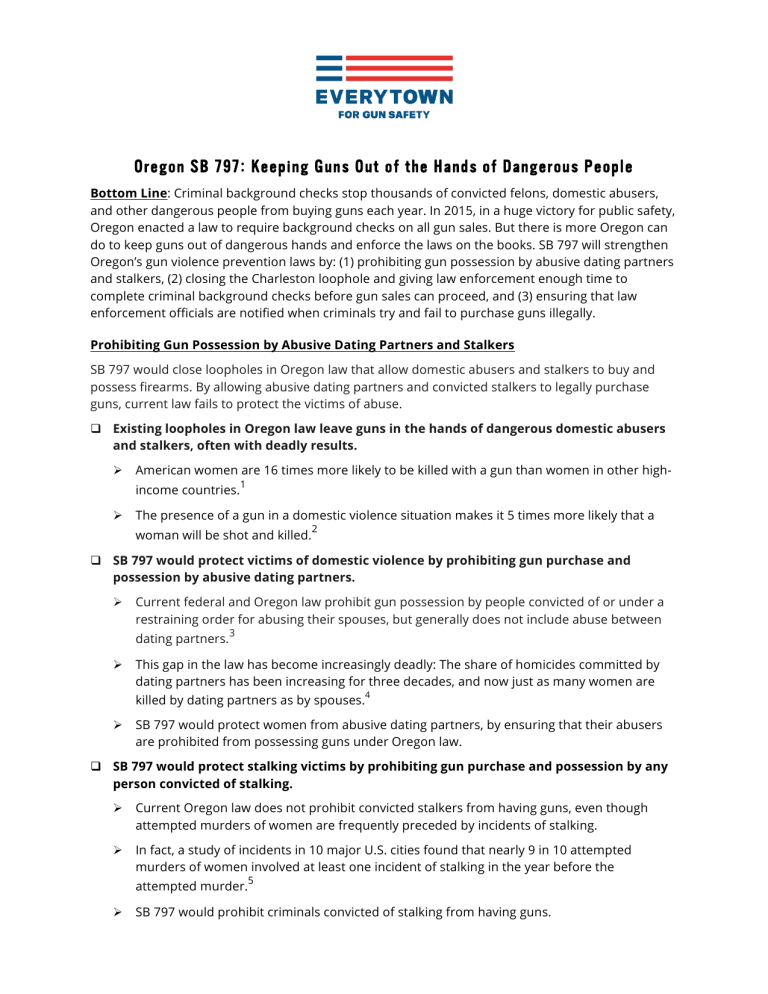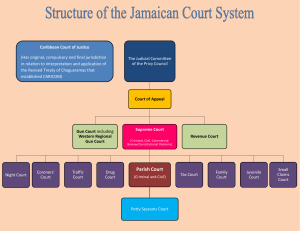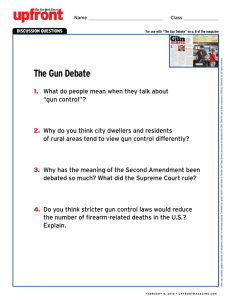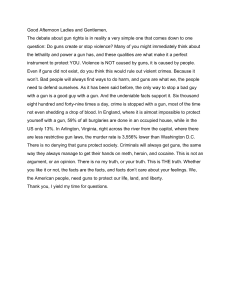
Oregon SB 797: Keeping Guns Out of the Hands of Dangerous People Bottom Line: Criminal background checks stop thousands of convicted felons, domestic abusers, and other dangerous people from buying guns each year. In 2015, in a huge victory for public safety, Oregon enacted a law to require background checks on all gun sales. But there is more Oregon can do to keep guns out of dangerous hands and enforce the laws on the books. SB 797 will strengthen Oregon’s gun violence prevention laws by: (1) prohibiting gun possession by abusive dating partners and stalkers, (2) closing the Charleston loophole and giving law enforcement enough time to complete criminal background checks before gun sales can proceed, and (3) ensuring that law enforcement officials are notified when criminals try and fail to purchase guns illegally. Prohibiting Gun Possession by Abusive Dating Partners and Stalkers SB 797 would close loopholes in Oregon law that allow domestic abusers and stalkers to buy and possess firearms. By allowing abusive dating partners and convicted stalkers to legally purchase guns, current law fails to protect the victims of abuse. q Existing loopholes in Oregon law leave guns in the hands of dangerous domestic abusers and stalkers, often with deadly results. Ø American women are 16 times more likely to be killed with a gun than women in other highincome countries. Ø 1 The presence of a gun in a domestic violence situation makes it 5 times more likely that a woman will be shot and killed. 2 q SB 797 would protect victims of domestic violence by prohibiting gun purchase and possession by abusive dating partners. Ø Current federal and Oregon law prohibit gun possession by people convicted of or under a restraining order for abusing their spouses, but generally does not include abuse between dating partners. Ø 3 This gap in the law has become increasingly deadly: The share of homicides committed by dating partners has been increasing for three decades, and now just as many women are 4 killed by dating partners as by spouses. Ø SB 797 would protect women from abusive dating partners, by ensuring that their abusers are prohibited from possessing guns under Oregon law. q SB 797 would protect stalking victims by prohibiting gun purchase and possession by any person convicted of stalking. Ø Current Oregon law does not prohibit convicted stalkers from having guns, even though attempted murders of women are frequently preceded by incidents of stalking. Ø In fact, a study of incidents in 10 major U.S. cities found that nearly 9 in 10 attempted murders of women involved at least one incident of stalking in the year before the 5 attempted murder. Ø SB 797 would prohibit criminals convicted of stalking from having guns. Closing the Charleston Loophole There is currently a gap in federal law that allows people who are legally prohibited from having guns, like the Charleston church shooter, to buy them from licensed gun dealers without passing a criminal background check if three business days have passed since the check began. Nearly 59,000 prohibited people have obtained guns through this loophole since the background check system was implemented in 1998. SB 797 would close this gap by giving the Oregon State Police more time to complete background checks on gun buyers who have complicated criminal histories. Oregon would join 18 other states that give authorities longer than 3 days to complete background checks. q Federal law allows firearm sales to proceed once three business days have elapsed, even 6 if the buyer’s criminal background check is not yet complete. Ø Federal law requires that licensed gun dealers run background checks on all gun buyers. In Oregon, background checks are run through the Oregon State Police Firearms Instant Criminal Background Check System (FICS), a series of state and federal electronic databases. Ø When a dealer runs a check on a potential buyer, he contacts the State Police. OSP enters the person’s name into the FICS system and reviews the person’s criminal records to determine if the person is prohibited from possessing or purchasing guns. Ø Most of the time, there is an immediate response and the sale either proceeds or is denied. 7 But in a small minority of cases (about 5 percent ), OSP cannot determine from the available records whether the purchaser is prohibited. In these cases, OSP must investigate further to make a determination, including by contacting courts and local law enforcement. Ø Under current law, firearm dealers may sell guns to buyers with complicated criminal histories after three business days, even when OSP has not yet determined whether the buyer’s criminal history prohibits him or her from possessing a gun. q According to the FBI, the Charleston shooter was able to purchase the gun he used in the massacre because current law allowed the sale to proceed before the shooter’s criminal background check was complete. Ø The Charleston shooter tried to buy a gun on April 11, 2015, and the sale went forward by default after three business days—even though the background check was incomplete. Ø According to the FBI, had the background check on the Charleston shooter been completed, the sale would have been stopped because the completed check would have shown that the Charleston shooter was prohibited from purchasing or possessing a firearm due to his 8 recent admission of illegal drug use. q FBI data shows that this gap in the background check law has resulted in default gun sales to nearly 59,000 criminals and other prohibited people. Ø Since the inception of the background check system in 1998, gun dealers nationally have gone forward with nearly 59,000 gun sales to prohibited people because a background check 9 could not be completed within three business days. Ø FBI and the Department of Justice have recommended that the three-day time period be 10 extended to minimize the number of gun sales that proceed by default. q At least 18 states and Washington, DC give authorities longer than three days to complete 11 a background check before allowing dealers to complete a sale. For example: 2 Ø In Utah, gun dealers may not transfer a gun to a buyer until the background check is 12 complete. Ø In Colorado, authorities deny sales to people based on an arrest for a potentially prohibiting crime if the final disposition is not available. If the prospective buyer appeals the denial, 13 authorities have 30 days to determine if the person is eligible to possess a gun. Ø Under California law, dealers must wait 30 days before selling a gun if the background 14 check operators have not resolved certain delayed investigations. q Senate Bill 797 will allow law enforcement to complete background checks on potential gun buyers in Oregon who have complicated criminal histories. Ø Under the bill, dealers would not be able to deliver a firearm to a potential gun buyer until the criminal background check is complete. Ø This will give OSP investigators time to thoroughly conduct the background check in the small number of complicated cases where the task of obtaining and analyzing records to determine if the buyer is prohibited from having guns takes more than three business days. Enforcing the Law Against Criminals Who Try to Buy Guns Illegally It is illegal under Oregon law for a person who is prohibited from buying firearms to attempt to purchase a gun. Criminals who try to buy guns despite being prohibited are very dangerous; in fact 30 percent of them are arrested within five years of failing the gun background check. SB 797 would require Oregon State Police to alert local law enforcement each time a prohibited person tries and fails to purchase a gun, enabling police to stop dangerous people before they obtain guns illegally. q Prohibited people who attempt to buy guns are extremely dangerous. Ø A study commissioned by the Department of Justice found that thirty percent of criminals 15 who failed background checks over the course of a year were re-arrested within five years. Ø In 2011, a severely mentally ill man tried to buy a gun in Oregon but failed the background check. After going unpunished for lying on the gun background check form, he bought a gun in New Mexico (where background checks are not required on all gun sales) and used that gun to shoot eight people, killing one, in Pittsburgh, Pennsylvania. q Federal officials rarely investigate and prosecute people for trying to buy guns by lying about their prohibited status. Ø It is a federal offense for a prospective gun purchaser to lie about his prohibited status on 16 the background check form he fills out at a dealer. Ø But in 2009 only 6.6 percent of the 71,000 denials that year were referred to ATF field offices 17 for investigation, and only 140 of those cases were recommended for prosecution. q Oregon can fill this gap by alerting local law enforcement when prohibited people try to buy a gun and fail the background check. Ø It is a crime in Oregon for a prospective gun purchaser to lie about his prohibited status and 18 try to buy a gun. And Oregon is a “Point of Contact” (POC) state—meaning the Oregon State Police conduct background checks, instead of the FBI—so in-state authorities know every time a prospective gun buyer fails a background check. 3 Ø Other POC states like Pennsylvania and Virginia have comprehensive programs in place to pursue people who break these laws, and the results are impressive. § In Virginia since 1989, state police investigations have led to nearly 15,000 arrests of 19 prohibited purchasers who tried to buy guns illegally and were denied. § In 2015 alone, local police in Pennsylvania arrested 2,312 people statewide who failed 20 background checks. q SB 797 will ensure that information is shared among all relevant law enforcement agencies so dangerous people who break the law can be held accountable. Ø SB 797 will help enforce Oregon’s background check system by: § Requiring OSP to notify all relevant law enforcement agencies and prosecutors each time a dangerous person tries to purchase a gun illegally and fails a background check; § Requiring law enforcement and prosecutors to report back to OSP on what action, if any, was taken in each case, or if no action was taken, the reason for the inaction; and § Directing OSP to aggregate the information and publish an annual report on the number of “lie-and-try” offenses investigated, and the result of each investigation and prosecution. 1 Grinshteyn, E., & Hemenway, D. (2016). Violent death rates: the US compared with other high-income OECD countries, 2010. The American journal of medicine, 129(3), 266-273. 2 J.C. Campbell, D. Webster, J. Koziol-McLain, et. al., Risk Factors for Femicide in Abusive Relationships: Results From a Multisite Case Control Study, 93 AMER. J. OF PUBLIC HEALTH 1089-97 (2003). 3 18 U.S.C. § 922(g)(8); 18 U.S.C. § 921(a)(32); O.R.S. § 166.255(1). 4 Alexia Cooper and Erica L. Smith, Homicide Trends in the United States, 1980-2008 (Washington, D.C.: U.S. Department of Justice, Nov. 2011), available at http://www.bjs.gov/index.cfm?ty=pbdetail&iid=2221. 5 Judith MacFarlane, Jacquelyn Campbell, et. al., Stalking and Intimate Partner Femicide, 3 Homicide Studies No. 4, 300-16 (Nov. 1999). 6 http://bit.ly/1Hj5glm 7 OSP FICS Unit. 8 http://usat.ly/1Gcvrsi 9 FBI, NICS Operations Reports, 1998-2015. 10 http://1.usa.gov/1LWArZc 11 California: Cal. Pen. Code § 28220(f); Colorado: C.R.S. § 24-33.5-424(3)(b); Connecticut: Conn. Gen. Stat. § 29-36g(a), Conn. Gen. Stat. § 39-37q, Conn. Gen. Stat. § 29-28a; District of Columbia: D.C. Code § 7-2502.07(b); Hawaii: H.R.S. § 134-2(e); Illinois: 430 ILCS § 65/5; Maryland: Md. Public Safety Code Ann. § 5-117.1(h); Massachusetts: ALM GL ch. 140, §§ 129B, 131; Minnesota: Minn. Stat. § 624.7132 subd. 4; New Jersey: N.J. Stat. § 2C:58-3(f); New York: N.Y. Penal Law § 400.00(4-a); North Carolina: N.C. Gen. Stat. § 14-404(f); Rhode Island: R.I. Gen. Laws §§ 11-47-35(a)(1), 35.2(a); Tennessee: Tenn. Code Ann. § 39-17-1316(o); Utah: Utah Code Ann. § 76-10-526(5); Washington: Rev. Code Wash. (ARCW) § 9.41.092. 12 Utah Code Ann. § 76-10-526(5) 13 C.R.S. § 24-33.5-424(3)(b) 14 Cal. Pen. Code § 28220(f) 15 James Tien et al., Structured Decisions Corporation, Recidivism of Denied Prospective Firearm Purchases, May 2008, at http://1.usa.gov/1Dm1lSG. 16 18 U.S.C. § 922(a)(6). 17 See FBI, Ronald J. Frandsen, Enforcement of the Brady Act, 2010: Federal and State Investigations and Prosecutions of Firearm Applicants Denied by a NICS Check in 2010, at: https://www.ncjrs.gov/pdffiles1/bjs/grants/234173.pdf. 18 O.R.S. §§ 166.416, 166.425. 19 Virginia Firearms Transaction Center Statistics, Aug. 2014. 20 Pennsylvania State Police, 2013 Firearms Annual Report, at http://www.psp.pa.gov/firearmsinformation/firearms%20Annual%20report/Pennsylvania_State_Police_2013_Firearms_Annual_Report.pdf. 4


